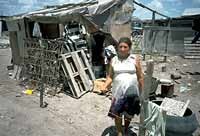
Borderline Cases 1997
Distributed by Bullfrog Films, PO Box 149, Oley, PA 19547; 800-543-FROG (3764)
Produced by Lynn Corcoran
Directed by Lynn Corcoran
VHS, color, 65 min.
Adult
Environmental Studies, Sociology
Date Entered: 11/09/2018
Reviewed by Terrence McCormack, Law Library, State University of New York at Buffalo, Buffalo, New YorkIn her work Borderline Cases, Lynn Corcoran delineates the harsh reality that unregulated industrialization imposes on a society that is unprepared to manage the environmental and social consequences. Corcoran effectively presents the argument that corporate capital flight from the United States is not restricted to the pursuit of a lower cost labor but, also serves as an escape from environmental regulations and enforcement. While the documentary does advocate the environmentalist perspective, Corcoran offers compelling visual arguments that tell of Mexico's years of industrialization occurring without the necessary infrastructure development. Her program successfully conveys to viewers, that the dearth of governmental regulation and appropriate services has compromised community health, and worked to escalate environmental problems along the border.
Corcoran first travels to the new Trico plant in Mexico were the company has joined the 2000 factories or maquiladoras that North American and European companies have established during the last few decades. Viewers meet the Mexican Trico work force, while Corcoran's narration emphasizes their wage disparity from their American counter-parts. She suggests, in several parts of the program, that low wages and poverty among Mexican workers have a direct relationship to corporate and governmental irresponsibility for the environment. This view is reinforced during tours of make-shift and dilapidated houses that are located along dirt roads near industrial sites. These shanty towns, that are home to the maquiladora workers, are complete with contaminated drainage ditches from residential sewage and the toxic waste of nearby industry.
The producer introduces viewers to the managers of several companies who admit that they have relocated because of strict environmental enforcement in the U.S. However, these same companies also claim that they are abiding by the Mexican law and NAFTA with regard to the removal of toxic waste from Mexico. While this may be the case for a few companies, Corcoran travels the 2000 mile border uncovering ample evidence in the form of soil, water and air contamination that supports the thesis that most companies, operating on the Mexican side of the border, are willfully disregarding environmental and community health concerns.
While offering few solutions the program does a very good job of informing viewers on the extent of the problem. The program's technical and video quality worked well to visually express the hard reality of the message. The only possible criticisms are that the producer could have edited the program to under one hour; and she spent too much time on issues related but not central to the documentary's main theme. Recommended for anyone interested in the effects of corporate mobility and NAFTA.